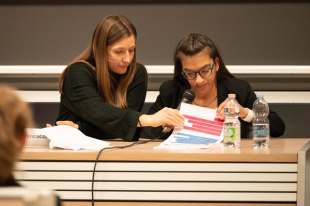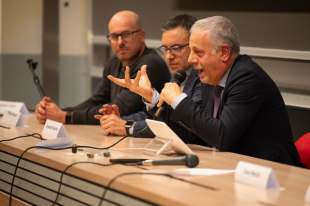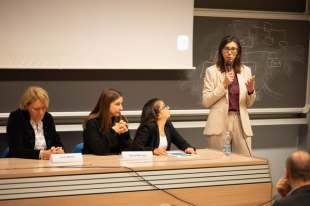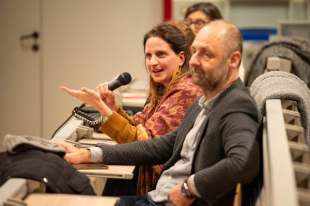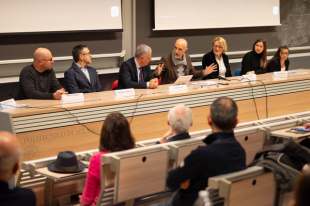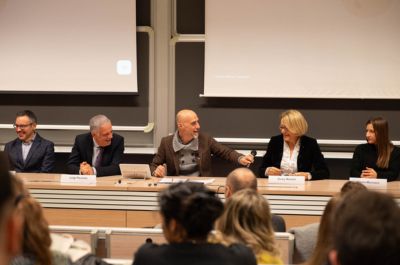
The tale of how Mehcanical Engineering can break down barriers related to different forms of disability
On the occasion of the International Day of Persons with Disabilities, as part of the initiatives organized by the Delegate of the Rector for MultiChance, Alessandro Campi, and the Equal Opportunities staff at the Politecnico di Milano led by Silvia Barattieri, the event "La Meccanica dell’inclusione" (in English the mechanics of inclusion) took place on December 4th at the Politecnico di Milano, organized by the Department of Mechanical Engineering. Some of the doctors, entrepreneurs, and third-sector operators who have collaborated over the years with our DMEC researchers on disability-related topics were invited to a round table that allowed for a deeper exploration of the role that engineering, especially mechanical engineering, plays in overcoming barriers related to various forms of disability. It provided a valuable space for dialogue and sharing about the current state of research, accomplished work, and expectations. All the interventions, diverse and stimulating in their uniqueness, were presented by professors and professionals who shared their stories.
Giusy Martelli, an entrepreneur affiliated with CareWatch S.r.l., collaborated with Professor Marco Tarabini from the Department of Mechanical Engineering on the Carewatch project. This initiative focused on developing a home monitoring system for seniors with motor disabilities through a 3D vision system. Together, they shared how the developed technology serves both as a fitness tracker and a fall detection device, showcasing the potential of engineering solutions to improve the quality of life for the elderly and those facing mobility challenges.
Emma Mencacci, Pedagogical Coordinator at Aspoc Lab Onlus, shared reflections on collaborative efforts with Professor Mario Covarrubias (Department of Mechanical Engineering) at the Laboratory of Virtual Prototyping and Augmented Reality in Lecco. Since September 2019, they have organized workshops aimed at developing social and intellectual skills for young people with cognitive delays. An added value was the testimony of Gaia, a young student, who shared her personal participation in these workshops.
Dr. Luigi Piccinini, a physiatrist at IRCCS E. Medea - Associazione La Nostra Famiglia, collaborated with Professors Manuela Galli (Department of Electronics, Information, and Bioengineering), Emanuele Lettieri (Department of Management Engineering), and Francesco Braghin (Department of Mechanical Engineering) on the GIFT project. This initiative led to the development and experimentation of innovative orthoses for hemiplegic children attending primary school. The project reflects a commitment to responding to the specific needs of children with motor disabilities, emphasizing the potential impact of engineering solutions on rehabilitation.
Vittorio Podestà, Olympic Handbike Champion at the 2016 Paralympic Games in Rio de Janeiro, brought a unique perspective to the event. In collaboration with Professors Marco Belloli, Federico Cheli (Department of Mechanical Engineering), and Stefano Giappino (GVPM) he conducted tests at the Politecnico di Milano's Wind Tunnel (GVPM) aimed at optimizing materials and the aerodynamic position of the athlete on the handbike: an example of how engineering can be employed to improve the sports performance of athletes with disabilities.
Finally, Alessandro Specchia, Specialist in Rehabilitative Medicine at Ospedale Valduce Villa Beretta, collaborated with Professors Alessandra Pedrocchi (DEIB), Francesco Braghin, and Marta Gandolla (DMEC) on projects like BRIDGE, EMPATIA, and AGREE, aimed at developing a motorized exoskeleton for upper limbs.
The event was moderated by Maurizio Melis, a science communicator and host on Radio 24 - Il Sole 24 Ore, who has been engaged for years in the themes of engineering in the service of humanity.
Beyond providing an opportunity for discussion, this event highlighted the significant impact of collaborations between academia, industry, and healthcare professionals. The shared stories and projects highlighted the central role of engineering in creating technologically innovative solutions that break down barriers and contribute to a more inclusive future.

